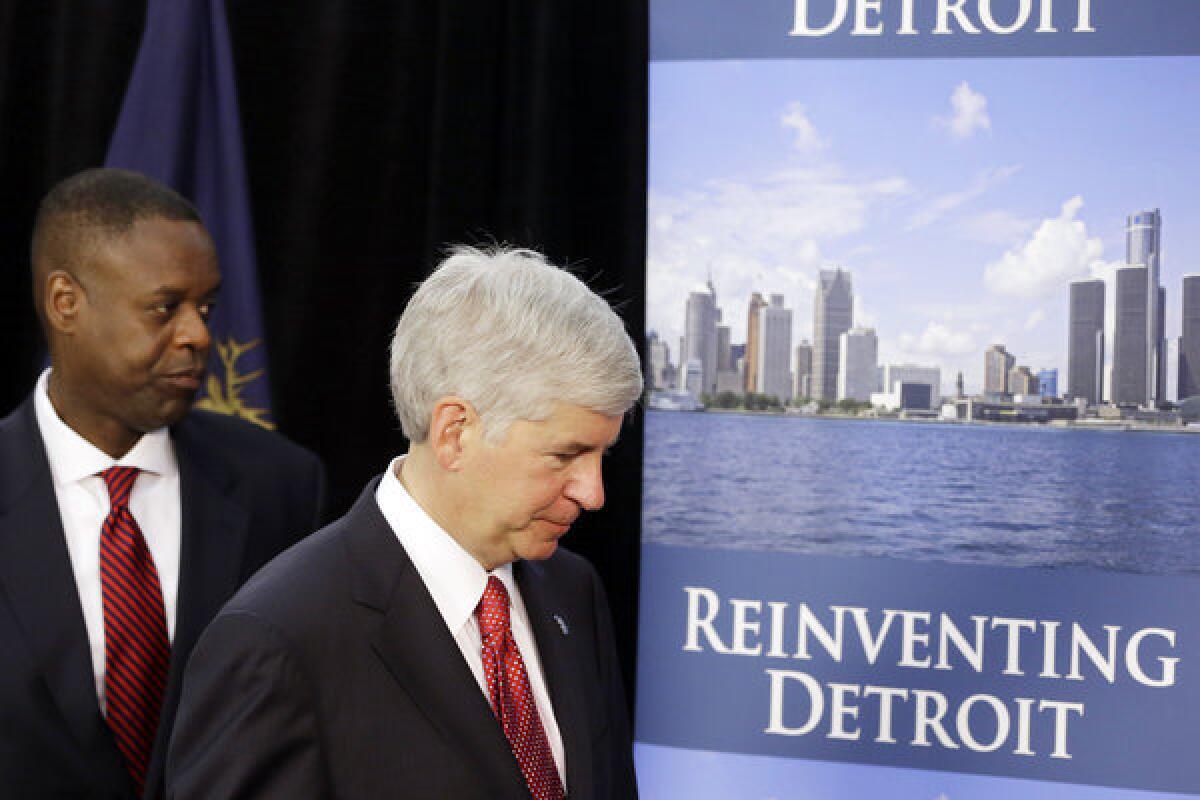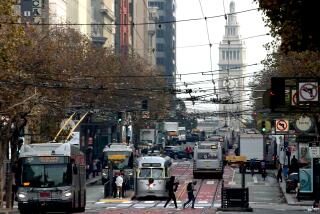Detroit’s comeback may already have begun

- Share via
Good news for city dwellers. According to a study published this week, we are 20% less likely to die from serious injury than our counterparts in rural America. Sure, homicide rates are higher in cities. But in rural areas, access to trauma and emergency medical care is thinner, meaning there are higher incidents of death related to drugs, poisonings and car accidents.
Not that the good people of Detroit were probably celebrating the study’s findings. The city’s morale is at an all-time low after having to file for bankruptcy this month, underscoring that the once-great city is now an urban wasteland home to a diminishing population. The acidic cherry on top: A faction of people seemed to delight in Detroit’s failings, gleefully pointing fingers at “liberal-socialist, Democrat policies” that they believe caused the city’s mess.
Of course, Detroit didn’t collapse overnight, nor is there just one factor to blame. Barry Goldman, who served as deputy director of the Human Rights Department in former Mayor Coleman Young’s administration, recently explained it this way in our Op-Ed pages:
“A wise old professor once told me that all simple political explanations are fundamentally optimistic. The idea is that there is a madman at the wheel. If we could only knock out the madman and grab the wheel, everything would be OK. The sad truth, he said, is that there is no madman. And there is no wheel.”
There is, however, an optimistic way to look at the situation in Detroit. Having to file for bankruptcy may feel like an admission of failure, but it’s also an opportunity to hit the restart button. Played correctly, Detroit’s renewal could become the blueprint for what the city of the future should look like.
In an Op-Ed this week, Michelle Wilde Anderson, an assistant professor at UC Berkeley School of Law, said Detroit needs to answer this question: “What level of public services will we protect and guarantee for U.S. cities?” She wrote:
For now, it is left to politics and moral judgment to determine whether it is acceptable that less than 1 in 3 streetlights are operational in Detroit or that the city has 80,000 abandoned and blighted structures that it cannot afford to demolish. In Detroit, as in many other struggling cities, dramatic police layoffs mean that the average wait time after a 911 call for a police officer is 58 minutes, and a resident can rarely summon an officer at all if the reported crime is not in progress and violent. […]
As a political and moral matter, as much as a legal one, Detroit represents an opportunity to take a stand for urban habitability. What belongs on our list of minimum standards for a city? Detroit invites us to have a public conversation about what services and public spaces we expect from city governments for human dignity and for humans to flourish. We have a chance to say that no one should have to wait hopelessly for an ambulance, that a violent crime in a neighborhood every few hours is intolerable.
Beyond improving public services, Bruce Katz of the Brookings Institute says cities such as Detroit should focus on fundamentals. On Thursday’s episode of NPR’s “Fresh Air,” he said cities shouldn’t rely on tourism to nourish the economy. Instead, he said to think along these lines:
What do you make? What services do you provide? What do you trade, to either other parts of the United States or other parts of the world? And who do you trade with? And do you have the skilled workers and collaboration between universities and companies and entrepreneurs and labor unions so that you can really compete and prosper, but also build on your distinctive assets and advantages?
Those fundamentals also include investing in infrastructure, manufacturing and “equipping workers with the skills they need to compete in the global economy.”
As for Detroit’s potential, Katz said it’s already budding:
What we are seeing is a network of philanthropic and business leaders coming together to revive that core of the city. New firms, entrepreneurs, new housing, new retail — Whole Foods actually moved into midtown Detroit like two months ago. Something exciting is happening off the platform of what I could call good bones, good assets, older iconic historic buildings. I see energy and pragmatism and an affirmative vision stemming from the core of that city.
ALSO:
Tech (Google Glass) + Porn = unstoppable
Five reasons to stay away from Texas right now
Follow Alexandra Le Tellier on Twitter @alexletellier
More to Read
A cure for the common opinion
Get thought-provoking perspectives with our weekly newsletter.
You may occasionally receive promotional content from the Los Angeles Times.






